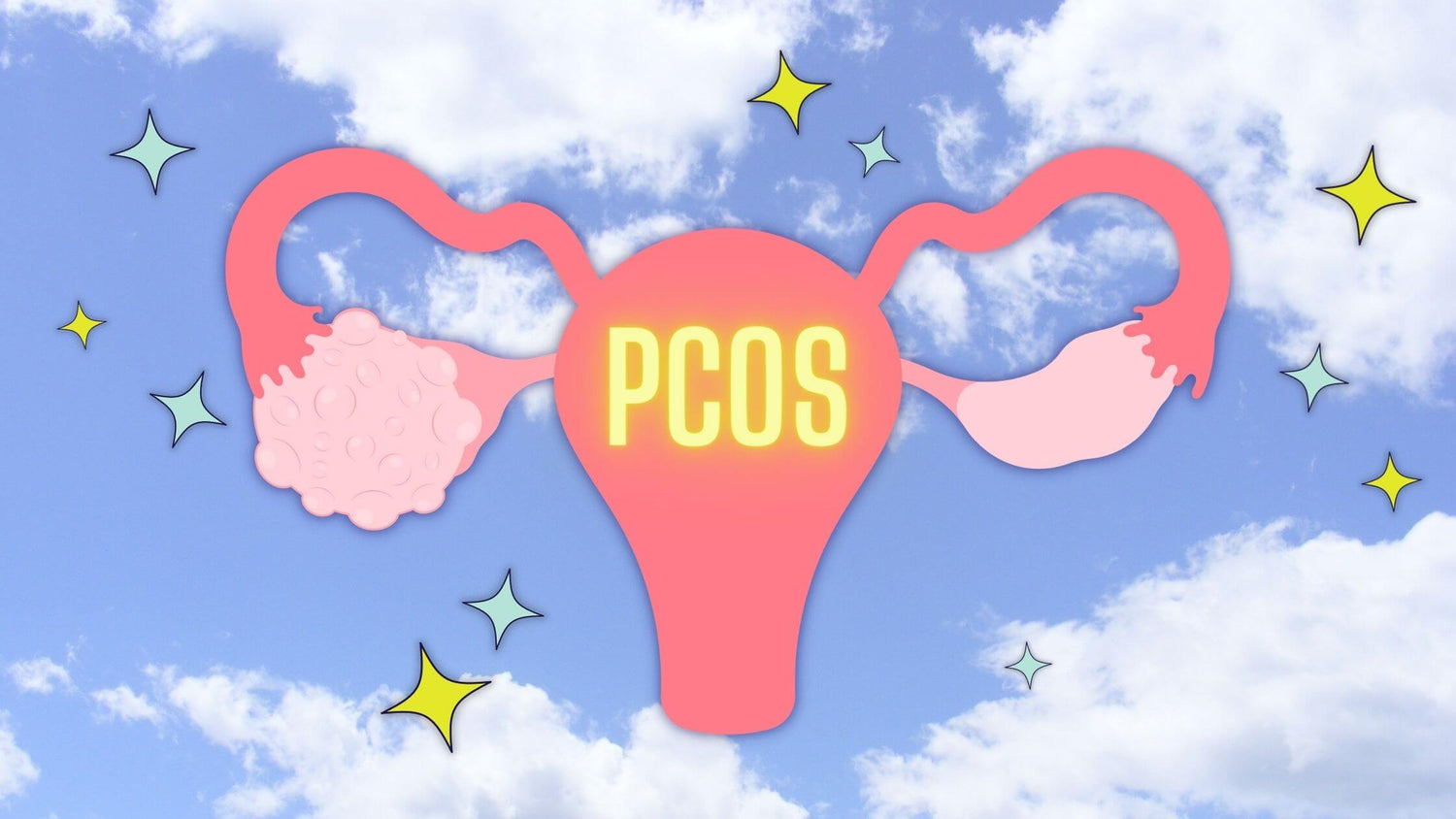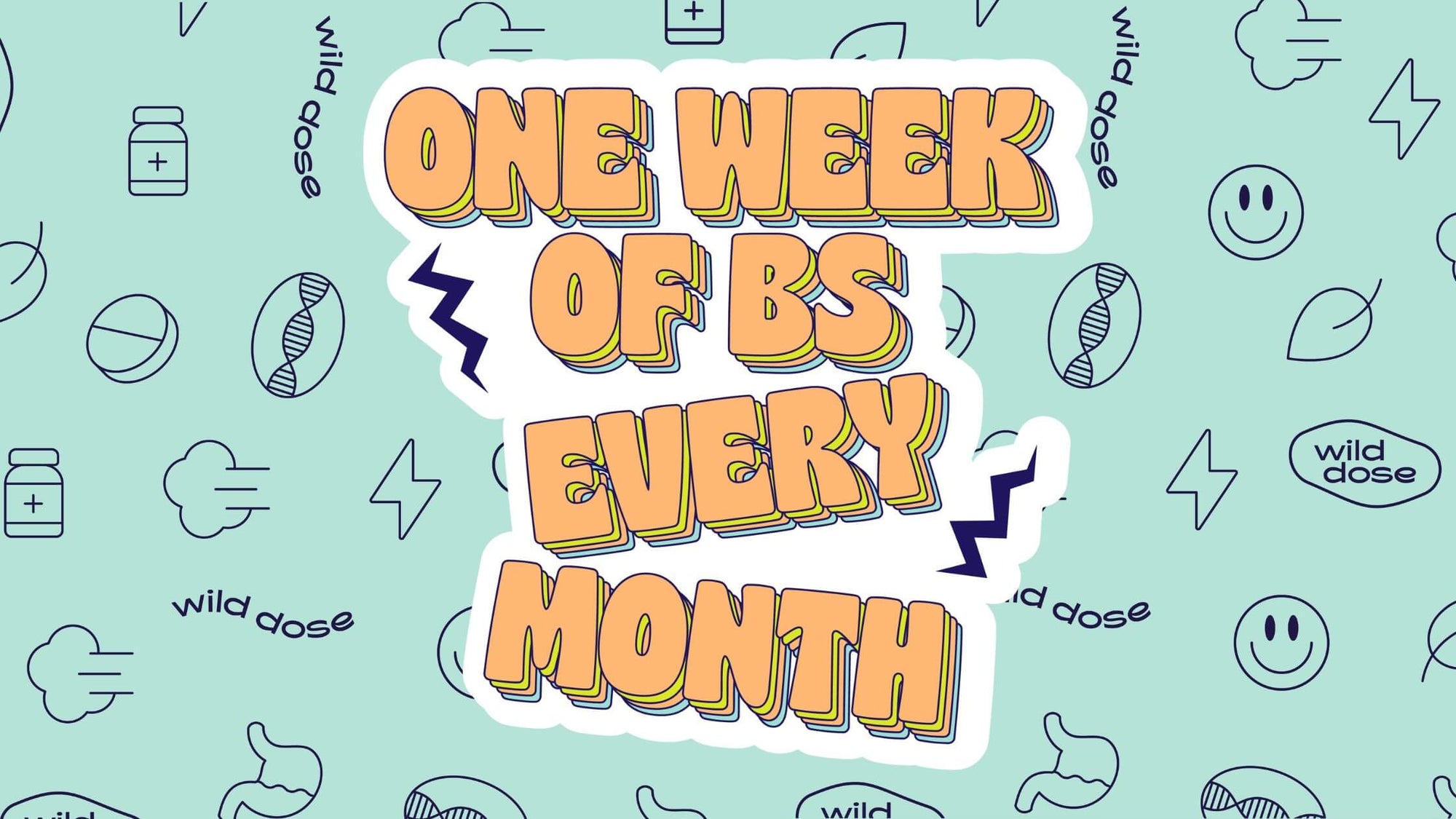How To Stop PCOS Bloating
Polycystic ovary syndrome, often shortened to PCOS, is a condition that affects women in their reproductive years. Although the symptoms of PCOS were first described all the way back in 1721, it’s only in the last decade or so that people have become more aware of this relatively common condition.
Whether you or somebody you know has a PCOS diagnosis, it’s great to learn more about the condition and how it can impact overall health and hormonal balance.
In this article, we will cover everything you need to know about polycystic ovary syndrome. In particular, we want to focus on a common symptom of PCOS, bloating, and how to identify and prevent PCOS bloating. At the end of the article, we will provide some helpful lifestyle changes to reduce bloating.
What Is PCOS?
Polycystic ovary syndrome describes a condition that impacts women in their reproductive years, and it impacts the levels of sex hormones in the body.
Although PCOS is related to a woman’s menstrual cycle, it’s actually a metabolic and endocrine (hormonal) condition, as its roots lie in insulin resistance. In fact, it’s the most common endocrine disorder affecting women, although the prevalence of PCOS varies between countries, races, and ethnicities.
PCOS is characterised by enlarged ovaries with the presence of large fluid-filled sacs that surround the eggs. These cysts can disrupt the functions of the ovaries and often causes delayed ovulation and irregular periods.
These large fluid-filled sacs can be up to 8 mm in size. This might not sound very big, but several of these sacs on a single ovary can be significant!
It’s estimated that around 1 in every 10 women of reproductive age has PCOS. However, this is purely an estimation, and there are many women out there who never get a diagnosis because they think their symptoms are normal.
Plus, many women get wrongly diagnosed with PCOS because it resembles another coming reproductive issue called hypothalamic amenorrhea (we’ll talk more about this in the diagnosis section below).
What Are the Symptoms of PCOS?
The symptoms of PCOS include:
- Irregularities in the menstrual cycle, with the average cycle lasting between 60 and 90 days
- Difficult conceiving (getting pregnant) because of menstrual irregularities and delayed ovulation
- Weight gain
- Acne, especially on the chin and upper back
- Hirsutism (excessive hair growth), particularly on the chest, upper back, and bum
- Hair loss on the head
- Bloating and abdominal cramping
A lot of women find that their symptoms lessen and their menstrual cycle becomes more regular as they approach menopause. However, the underlying hormonal imbalances associated with PCOS don’t change with age, so it might be that women just learn how to manage their symptoms more effectively as they get older.
The Diagnosis of PCOS
There are three main things that doctors look for when diagnosing polycystic ovary syndrome.
The three diagnostic features of PCOS are:
- High androgen levels in the blood, including high testosterone (this often causes symptoms like acne, excess hair growth, and weight gain)
- Polycystic ovaries (the presence of fluid-filled sacs called follicles that surround the eggs in the ovaries)
- Irregular periods (usually with very heavy menstrual bleeding and random cycle lengths that can be up to 90 days long)
The issue here is that hypothalamic amenorrhea (loss of the menstrual cycle due to excessive physical or psychological stress (or both)) can present similar symptoms as PCOS. Women with hypothalamic amenorrhea (HA) have no periods or might have extremely long menstrual cycles lasting hundreds of days. They might also have polycystic ovaries.
For this reason, doctors can misdiagnose a woman with PCOS when they actually have hypothalamic amenorrhea. This is a huge issue because the management steps for PCOS vs. HA are complete opposites.
To confirm a PCOS, a woman must have high androgen levels plus one of the other features mentioned above (polycystic ovaries or irregular periods). If they have normal androgen levels but have polycystic ovaries and an irregular menstrual cycle, they likely have HA.
What Causes PCOS Bloating?
We mentioned above that one of the main symptoms of PCOS is bloating. Let’s take a deep dive into PCOS bloating and the related hormonal imbalances.
While bloating is a common symptom experienced by women without PCOS, those with the condition might experience it at specific times of the month or more frequently than those without a PCOS diagnosis.
Here are the main causes of PCOS bloating.
1. Hormonal imbalances
PCOS is an endocrine disorder, meaning its root cause is hormonal imbalances. It is characterised by an imbalance in the levels of androgens (male hormones) and insulin.
These imbalances can lead to changes in digestion and may contribute to regular bloating and digestive discomfort.
2. Insulin resistance
Many women with PCOS also have insulin resistance (and it’s thought that this is one of the causes of PCOS). High insulin resistance makes it difficult for the body to use glucose properly and causes high levels of insulin to circulate in the blood, both of which can increase water retention and bloating.
3. Slow digestion
Hormonal imbalances in PCOS can affect the movement of food through the digestive system, leading to slower digestion. When food stays in the digestive tract for a longer period, it can cause bloating and discomfort.
4. Food sensitivities
Women with PCOS may have sensitivities to certain foods or food groups. Consuming these foods can trigger digestive issues, such as bloating, excess gas, and abdominal cramping.
5. Gut dysbiosis
Gut dysbiosis refers to when the levels of beneficial and harmful microorganisms are imbalanced in the gut. Research suggests that women with PCOS may have an altered gut microbiome, which could lead to digestive symptoms, including bloating.
6. Gut inflammation
Research suggests that women with PCOS have higher levels of inflammation in the intestines. Inflammation can cause swelling, bloating, and discomfort.
How to Know if Your Bloating is From PCOS
Bloating is a pretty common symptom that you can experience for a wide range of reasons. Even something as simple as eating a little more food than usual can cause bloating…so how do you know if your bloating is caused by PCOS? What distinguishes non-hormonal bloating from hormonal bloating?
The first step is to get a PCOS diagnosis or rule it out. For this, you’ll need to head to your doctor or a women’s health specialist so they can perform various diagnostic tests to confirm or rule out polycystic ovary syndrome.
If your doctor gives you a PCOS diagnosis, there’s every chance that your bloating could be related to your condition. However, if you don’t meet the diagnostic criteria for PCOS, your bloating is probably caused by something else (it could still be hormone-related bloating but won’t be PCOS bloating).
So, for those of you who know that you have PCOS, how can you determine whether your bloating is related to this?
Consider whether you get any other symptoms alongside your bloating. You might find that your bloating is worse when you menstruate (whether this is every two, five, or seven months). Do you find that your acne worsens when you’re bloated (or vice versa)? Do you notice more hair growth around the times when your bloating is more severe?
If you get bloating alongside a bunch of other symptoms, it’s likely related to your PCOS. You might find it helpful to keep a symptom diary to track this more easily.
You’ll need to rule out as many other causes of bloating as possible to determine whether it’s caused by polycystic ovary syndrome. Get some testing done to check whether you have any food allergies or sensitivities and to check for any digestive or pelvic abnormalities that could contribute to bloating.
How Can I Prevent PCOS Bloating
If you’re dealing with PCOS related bloating, you might be wondering what you can do to minimise your symptoms. Here are some top tips to reduce hormonal bloating quickly. You can try just one of these things or all of them, depending on what you find helpful.
1. Consume probiotics
Probiotics are live bacteria that aid digestive processes and vitamin production in the gut. You’ll naturally have billions of probiotic bacteria in your colon, but they can sometimes become unbalanced if there is non-probiotic bacteria overgrowth.
Consuming more probiotic foods or taking a probiotic supplement can help to reduce the levels of potentially harmful bacteria and boost the levels of good bugs in your gut. This can help to improve digestive health and reduce boosting quickly.
Probiotic foods and drinks include yoghurt, sauerkraut, kefir, tempeh, tofu, natto, miso, and kimchi.
If you choose to take a supplement, make sure it contains at least one billion colony-forming units (CFUs) of probiotic bacteria. Our supplement, A Dose For Bloating, contains two billion probiotics alongside seven digestive enzymes and seven natural plant extracts. Taking our supplement daily will significantly improve your digestion and minimise negative digestive symptoms like bloating.
2. Eat smaller meals more frequently
Consuming large volumes of food at once can exacerbate PCOS bloating, especially if you’re dealing with extreme hormonal imbalances.
Reducing your meal size and eating smaller meals more frequently throughout the day can ease the stress on your digestive system and enable it to fully digest the food in one meal before you eat again. As a result, you'll have less bloating and discomfort.
3. Consume prebiotics and cut out trigger foods
So, we spoke about probiotics, but what about prebiotics?
Prebiotics are fibres that are found in fruits, vegetables, whole grains, beans, legumes, nuts, and seeds. The probiotic bacteria in your gut can feed on prebiotic fibres to grow, thrive, and continue to support your digestion.
Increasing your consumption of prebiotics can improve your digestion and it’s a great natural remedy for reducing bloating. Alongside increasing the number of prebiotic fibres in your diet, consider reducing your intake of highly processed foods, as they often contain lots of saturated fat, salt, and sugar that can irritate your gut and cause excessive bloating.
Similarly, if you notice that your PCOS-related symptoms worsen when you eat certain foods, try to eliminate these from your diet. Common trigger foods for PCOS bloating include dairy, gluten, fried foods, spicy foods, and artificial sweeteners.
4. Move your body regularly
Inactivity can exacerbate bloating and other digestive issues. Keeping your body moving with regular exercise encourages food to move swiftly through your digestive tract, minimising the risk of PCOS bloating.
Exercise (particularly strength training) is also beneficial for improving insulin sensitivity. As we briefly spoke about above, women with PCOS often have high insulin resistance, so exercise is a great way to tackle this without relying solely on medications. Incorporate 2-3 full-body weightlifting workouts into your weekly routine to obtain these benefits.
Regular physical activity also aids in weight stabilisation and hormonal balance, both of which are essential for the long-term management of polycystic ovary syndrome. However, make sure you don’t overdo it with your training, as this can start to negatively impact your reproductive hormone levels and worsen your PCOS symptoms and severity.
5. Minimise your psychological stress
Psychological stress can cause huge hormonal imbalances that can make your polycystic ovary syndrome worse. It can also mess up your digestion and cause you to feel more bloated than usual. This is why stress management is so essential for managing PCOS bloating.
When you’re stressed, cortisol gets released, resulting in a fight-or-flight response. Your body shifts its focus away from sex hormone production and digestion onto fuelling your brain and muscles in case you need to run from danger.
By managing your psychological stress, you can reduce the risk of high cortisol levels in your blood and keep your hormonal and digestive functions working optimally.
Although we’ve focused on psychological stress here, the same applies to physical stress. Overtraining or undereating are forms of physical stress that can activate cortisol release and cause negative digestive symptoms like bloating (and several other awful non-digestion-related symptoms too).









